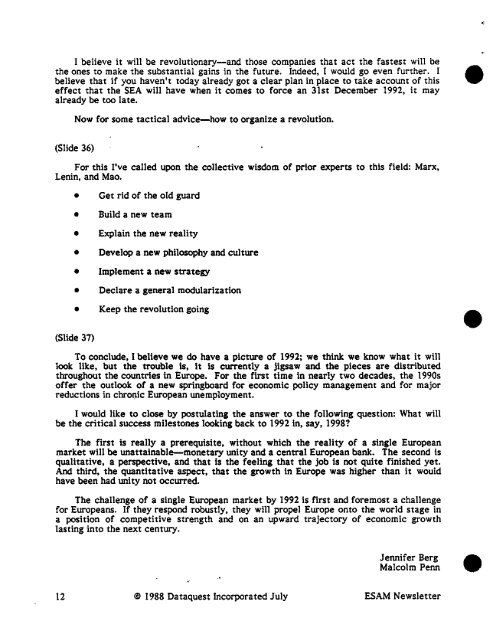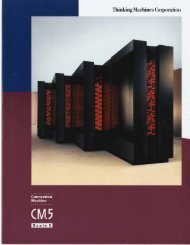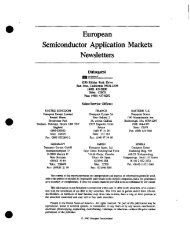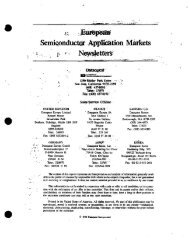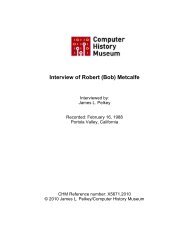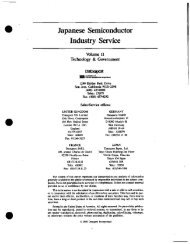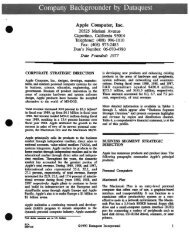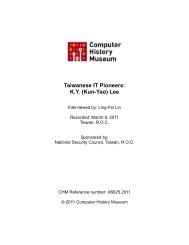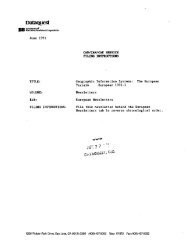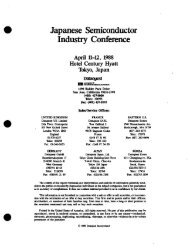- Page 1:
European Semiconductor Application
- Page 4 and 5:
Dataquest a company of The Dun& Bra
- Page 6 and 7:
i EUROPEAN SEMICONDUCTOR PROCUREMEN
- Page 8 and 9:
Europe-based manufacturers were con
- Page 10 and 11:
Table 2 (Continued) Major Semicondu
- Page 12 and 13:
Page Printers Page printers are com
- Page 14 and 15:
PRINTER INDUSTRY DEFINITIONS APPEND
- Page 16 and 17:
TABLE 1 Benefits from Electronic Fu
- Page 18 and 19:
TABLE 3 Key Electronic Electricity
- Page 20 and 21:
DataQuest aaMTipanyof ThcDunSTBrads
- Page 22 and 23:
ESAM 0002383 Parcemoea 100% f Figur
- Page 24 and 25:
Which Computer? The computers purch
- Page 26 and 27:
Atari, which became the number one
- Page 28 and 29:
However, although there can be litt
- Page 30 and 31:
DATAQUEST CONCLUSIONS The assertion
- Page 32 and 33:
1,200 1,000 800 600 400 200 0004613
- Page 34 and 35:
COMPETITIVE ENVIRONMENT IN THE UNIT
- Page 36 and 37:
However, having overcome the techni
- Page 38 and 39:
0004614-1 Figure 1 Cell-Repeat Patt
- Page 40 and 41:
Registration Within the system, a n
- Page 42 and 43:
i^M$M:M DataQuest accmipanyof ihe D
- Page 44 and 45:
30 minutes to 600 minutes by 1995.
- Page 46 and 47:
"Think Global—Act Global" Jose Me
- Page 48 and 49:
"Telecommunications Technologies fo
- Page 50 and 51:
Mv^-y5t5;fsi ^ci Research DataQuest
- Page 52 and 53:
Figure 2 Difference between Semicon
- Page 54 and 55:
Figure 4 Difference between Semicon
- Page 56 and 57:
Figure 6 Difference between Semicon
- Page 58 and 59:
Figure 8 Difference between Semicon
- Page 60 and 61:
Dataquest anticipates an era of gre
- Page 62 and 63:
fflOH GROWTH RATE ATTRACTS MANY NEW
- Page 64 and 65:
* Average selling prices (ASPs) wil
- Page 66 and 67:
DATAQUEST CONCLUSIONS The rapid ini
- Page 68 and 69:
Experienced disk drive producers we
- Page 70 and 71:
The Japanese may well make further
- Page 72 and 73:
CORDLESS STANDARDS CT2 cordless tec
- Page 74 and 75:
CT2's strengths reside in its appli
- Page 76 and 77:
The Upside Scenario Figure 1 shows
- Page 78 and 79:
Table 2 Estimated Semiconductor Con
- Page 80 and 81:
DATAQUEST CONCLUSIONS CT2's main ap
- Page 82 and 83:
The present ISA, or AT bus, is not
- Page 84 and 85:
MCA MCA Delivery Time IBM has been
- Page 86 and 87:
EISA Consortium Dataquest believes
- Page 88 and 89:
Dataquest Conference Schedule 1989
- Page 90 and 91:
Background The UNIX penetration int
- Page 92 and 93:
Figure 3 European UNIX Computer Shi
- Page 94 and 95:
1987 Total $22.4 Billion Figure 5 U
- Page 96 and 97:
DATAQUEST ANALYSIS The issue of UNI
- Page 98 and 99:
• Small department computers (SDC
- Page 100 and 101:
DataQuest Conference Schedule 1989
- Page 102 and 103:
8086/88 286 386 Non-compatible NA =
- Page 104 and 105:
ANALYSIS OF SEMICONDUCTOR CONTENT T
- Page 106 and 107:
FUTURE TRENDS The advent of markets
- Page 108 and 109:
Benelux France Italy Scandinavia U.
- Page 110 and 111:
Italy The Italian market exhibited
- Page 112 and 113: The Rest of Europe market is expect
- Page 114 and 115: Intel and National Semiconductor ha
- Page 116 and 117: Dataquest believes that continuing
- Page 118 and 119: Table 2 Estimated Semiconductor Con
- Page 120 and 121: Production in Europe Dataquest esti
- Page 122 and 123: Dataquest Conference Schedule 1989
- Page 124 and 125: THE STANDARDS: MAC VERSUS MUSE Euro
- Page 126 and 127: DATAQUEST ANALYSIS Evolution of MAC
- Page 128 and 129: Year Table 1 Estimated IC Value by
- Page 130 and 131: In addition to the $217 million mar
- Page 132 and 133: TOO MANY HURDLES? The promise that
- Page 134 and 135: Millions of Dollars 150 140 120 100
- Page 136 and 137: Dataqyesl I aoHTiparTvof The Di in
- Page 138 and 139: Figure 1 shows how the ISDN fits to
- Page 140 and 141: ISDN IC FUNCTIONS Table 1 Bus Forma
- Page 142 and 143: Figure 3 ISDN Semiconductor Demand
- Page 144 and 145: PTT (P
- Page 146 and 147: fe- Dataoyest OMporatnn Research Ne
- Page 148 and 149: Air Conditioners Microwave Ovens Wa
- Page 150 and 151: Bosch-Siemens has four plants in Ge
- Page 152 and 153: DataQuest t acompAiwcf The E^inK^sd
- Page 154 and 155: What, I hear you ask, gives me the
- Page 156 and 157: The 1980s have brought us to Phase
- Page 158 and 159: What I would like to do now is to e
- Page 160 and 161: (Slide 22) This necessary adjustmen
- Page 164 and 165: (Slide 1) (Slide 2) 1992: HAS EUROP
- Page 166 and 167: (Slide 5) (Slide 6) 1992 IMPACT •
- Page 168 and 169: (Slide 9) (Slide 10) EUROPEAN SEMIC
- Page 170 and 171: (Slide 13) (Slide 14) EUROPEAN COMP
- Page 172 and 173: (Slide 17) EUROPEAN END-USE VENDOR
- Page 174 and 175: (Slide 21) (Slide 22) Europe Other
- Page 176 and 177: (Slide 25) (Slide 26) rtnu stack ST
- Page 178 and 179: (Slide 29) (Slide 30) SUPPLIER/CUST
- Page 180 and 181: (Slide 33) (Slide 34) EUROPEAN ELEC
- Page 182 and 183: (Slide 37) THE 1992 CHALLENGE HIGH
- Page 184 and 185: Millions of Units 12- 10- 8- 6- 4-
- Page 186 and 187: Most of the Japanese firms are quit
- Page 188 and 189: Western Europe North America Rest o
- Page 190 and 191: Local Content In June 1987, the EEC
- Page 192 and 193: Activity Factory Set Up Change Expo
- Page 194 and 195: All this activity is of great inter
- Page 196 and 197: Table 2 European Facsimile Market S
- Page 198 and 199: Color Facsimile Machines The Japane
- Page 200 and 201: Productivity Race The facsimile out
- Page 202 and 203: mm Dataoyest aconwanyof The Diin& B
- Page 204 and 205: Figure 2 Geographic Distributi
- Page 206 and 207: Table 3 Semiconductor Inventories R
- Page 208 and 209: heavily used over their European co
- Page 210 and 211: Dataqyest acomranyof ihcDSnlTBradsb
- Page 212 and 213:
DATAQUEST ANALYSIS Prior to the int
- Page 214 and 215:
NOKIA As shown in Figure 1, the Nok
- Page 216 and 217:
Net sales from this division for th
- Page 219 and 220:
^m DataQuest a company of TneDun& B
- Page 221 and 222:
Country West Germany France United
- Page 223 and 224:
• Road map directories in automob
- Page 225 and 226:
Table 1 EUROPEAN COM^aJNICATIONS EQ
- Page 227 and 228:
Application Telex Teletex Videotex
- Page 229 and 230:
Dataquest a company of The Dun & Br
- Page 231 and 232:
Research Depth of research includes
- Page 233 and 234:
Table 3 EUROPEAN INPUT/OUTPUT RATIO
- Page 235 and 236:
Dataoyest k^ i m a company of ^ W D
- Page 237 and 238:
for mag stripe technology were adop
- Page 239 and 240:
financial community today, without
- Page 241 and 242:
•'95% Figure 1 MANUFACTURING AUT(
- Page 243 and 244:
standards to serve the Italian mark
- Page 245 and 246:
In an alliance with EMUG, 30 French
- Page 247 and 248:
In spite of these bright spots, Dat
- Page 249 and 250:
m^m Dataquesl T^^Suj-iA^^'-fT'i^v f
- Page 251 and 252:
Figure 2 Revenue by Region Source:
- Page 253 and 254:
Strategic Changes Figure 4 Worldwid
- Page 255 and 256:
Terminals Figure 5 Pyramid of Produ
- Page 257 and 258:
The Nixdorf 8850 Figure 6 Communica
- Page 259 and 260:
The Nixdorf 8870 The 8870 product f
- Page 261 and 262:
Figure 7 PHOTO OF PWS-X Source: Nix
- Page 263 and 264:
Communication between Nixdorf produ
- Page 265 and 266:
The business orientation continues
- Page 267 and 268:
Nixdorf intends to exploit the stre
- Page 269 and 270:
s^^^s-^f ^^^li^^^^^ DataQuest acomp
- Page 271 and 272:
Type of Deflktoo DevicB Display Ter
- Page 273 and 274:
INSTALLED BASE OF DESKTOP TERMINALS
- Page 275 and 276:
Word Processors Shipments of standa
- Page 277 and 278:
:oo« 80% 60% - 40% 20% Figures Eur
- Page 279 and 280:
Dataquest expects that by 1991, the
- Page 281 and 282:
Appendix A DEFINITIONS OF KEYBOARD
- Page 283 and 284:
Appendix B CONNECTION TECHNOLOGIES
- Page 285 and 286:
Manufacturer APD Apple Apricot Bull
- Page 287 and 288:
of computer graphics and storage su


